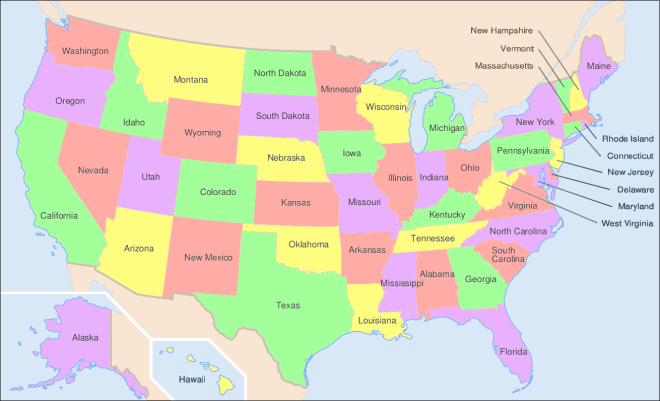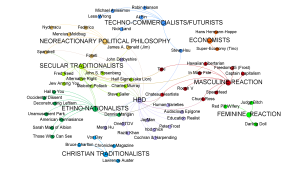[Yes, I’m still alive. I took time to write this post because the stars aligned; just recently I had this exact conversation with a friend, and a few days ago I read an article which made writing the discussion down worthwhile. This isn’t an argument against said article, just some related thoughts.]
I read Bicameral Reasoning at Slate Star Codex a few days ago. The gist of the article is this: expressing a situation as a series of categories tends to place equal weights on each category, whether they deserve such weighting or not. The example Scott gives is:
And I tend to think something like “Well, I agree with this guy about the Iraq war and global warming, but I agree with that guy about election paper trails and gays in the military, so it’s kind of a toss-up…”
…I like having paper trails in elections as much as the next person, but if one guy isn’t going to keep a very good record of election results, and the other guy is going to kill a million people, that’s not a toss-up.
I agree; this is a sound point and a logical fallacy that easily stems from the way we organize and express data.
He then continues to apply this to the bicameral United States Congress, with its 2-senators-per-state Senate, and proportionally-weighted Congressmen in the House, and wonders if this decision-making model skews politics far too heavily in directions that aren’t merited, or, as he says…”Why are you even looking at that other box?”
This brought two thoughts to mind:
I
I recently gave a presentation on the post-colonial Middle East, and as a prelude, gave what might have been the fastest and most Disney-cartoon-laden summary of Benedict Anderson’s Imagined Communities ever done. The book centers around the idea that since humans can only really belong to a group of a certain size (Dunbar’s Number), our larger organizations exist only symbolically. In contrast to our standard post-modern tendency to scoff at symbols (read: who cares what I look like/dress like/how I talk/what I name my child? I can do what I want!), Anderson stresses that these symbols are important because they are the mechanisms that bind nation-states together.
One of the most important mechanisms Anderson discusses is the iconographic map…the instantly recognizable outline of a nation’s borders. As part of the shift from the pre-modern to the modern world, people’s sense of space changed from one centered on capitals, holy places, and seats of power, and instead became one which expanded to the very edges of what they claimed. Before technology made the hinterlands accessible, and eventually controllable, large swaths of land were essentially unclaimed. But with technology, everything became accessible, and everything was then claimed. It turned people’s concept of the world from something like this, where state lines could easily be overlooked…
to the iconographic map people conjure up in their heads when they think of the United States:
In the top map, it might be easy to see how the population on the eastern coast of the depicted continent might be totally ambivalent if the northern–central land were to be invaded and claimed by a neighboring country. However, the bottom map makes it clear that North Dakota and Montana are Ours, just as much as New York and Maryland etc, and those Canadians better not get any ideas about crossing that border!
The concept that all land, things, people, etc, can be categorized in such a way that everything is 100% accounted for is a concept Anderson calls “totalizing classification” and is a modernity-enabled mindset which leads to many problems he addresses in the book, all of which I think are very interesting. However, to keep on-point here…
These maps illustrate the problem Scott points at; it seems ludicrous to give the north-central land the same weighting as New York State in decision-making!
Or does it?
I defended the practice of the Senate giving equal representation to the fly-over states to a friend of mine according to an argument I’ve made many times before, that goes something like this:
- Any given land has a carrying capacity
- Cities take advantage of transportation technology to consolidate the carry-able population
- This consolidation enables economies of scale…
- …which enables the transportation and other technology to exist…
- …which enables further consolidation…etc
- As a result, the larger the city is, the more surrounding land it should be viewed to be dependent upon
- The maps clearly show that our political boundaries separate the cities and the land they depend on
- The highly unnatural physical environment of a city, to say nothing of cultural factors, makes it unlikely that the average city-dweller understands either the extent to which they depend on the land around them, or the concerns and circumstances of the people and economies in those lands.
In the past, I have mostly talked about this from the cultural angle. For instance, I believe that the average apartment-dweller, whose landscaping is handled by the complex management, has far less appreciation for the amount of work required to maintain greenery than the average suburban homeowner, who in turn has less appreciation than a rural farmer, simply because of lack of exposure. It is all well and good to protest the use of pesticides when one’s practical experience with greenery is limited to the few trees permitted to poke through the city sidewalk, surrounded by a decorative, squared-off grate; it is quite another to protest pesticides after having lived the challenge of trying to maintain a green lawn, or grow a garden with a net-positive caloric yield. I often use this story to explain some of the roots of the liberal-urban/conservative-rural divide on many issues, but it is only a tiny step from there to see the real-world impacts and broken feedback loops of the policies which would likely be enacted if all policy-making was exclusively population-weighted.
In a society of philosopher-kings, city-dwellers would recognize and appreciate their dependence on rural economies, but in practice, no society of philosopher-kings exists. I suspect that in a myriad of issues, going to a strictly-proportional system of voting would even further un-anchor our political and intellectual culture from the physical realities of what it takes to feed, clothe, and power it. This is the essential failure of every country that ever tried to “modernize” or “Westernize” by forcing its rural and agricultural populations into the cities and then starved; Egypt, China, and Cambodia all come to mind off the top of my head, and I’m sure there are more.
So, I’m afraid my long-windedness might have obscured my point, so I’ll state it clearly here; Delaware and the cows may not “deserve” votes, but the economic security of New York depends on Delaware and cows having sufficient votes to veto the Great Leap Forward. Large cities only exist because they are able to harness the resources of the land around them, but they create environments where inhabitants are unfamiliar with the land around them. The city’s power grows in proportion to its ignorance of its own sustenance requirements. A city powerful enough to politically strongarm the rural lands it depends on is a city dangerously close to cutting off its nose to spite its face. It is imperative that reality be reckoned with before we go too far astray; it’s better to learn you can’t fly by jumping off a house than a skyscraper.
II
Let’s recap: I agree that categorization can lead to incorrectly weighting certain criteria. However, categorization can also be used to assure that correct weighting is assigned, when weighting need to be disproportionate.
I now write this second point knowing full-well that it will push Scott’s buttons. Maybe I’ll get a good counter-argument out of this.
I object to certain neologisms coming out of the Progressive world, because I believe they are done precisely to invoke the improper weighting Scott is concerned about. To the extent that they are deliberate attempts to control thought, I consider them Orwellian and nefarious. I’ll dive in with an example:
“Transgender” has had, and still has in almost all walks of life, the connotations that “trans” is meant to impart; the idea that boundaries are being crossed, that standards or conventions are being “transgressed,” that the subject of discussion is a deviation from the norm. Transgender people represent a tiny fraction of the population, so, all connotations aside, the denotation that identifying as transgender is a deviation from the statistical norm is accurate.
Recently, however, the term “cisgender” has arisen. (It’s new and rare enough that Google n-gram won’t even return results on it.) This shift in language from “so-normal-we-don’t-even-specify-it”/trans to cis/trans facilitates a shift away from recognition and reference to a statistical norm towards the statistically (and I suppose morally) neutral chemistry definitions of trans and cis…”the bonds go this way/the bonds go that way.”
This is, in my opinion, a very clear example of the type of proportion-obscuring categorization that Scott is concerned may be distorting our perceptions and judgments. It is for this reason that, while I don’t have anything in particular against transgendered people, I simply cannot muster the politically-correct level of required outrage to participate in a Two-Minutes-Hate when a school or shopping mall “fails” to “support” transgendered people’s restroom dilemmas; I am implicitly being forced to accept a categorized worldview of “Male, Female, Trans, (etc?)”, and am not allowed to put the problem into anything resembling proper perspective. Just because “Male, Female, Trans, Etc” all take up one line each on a survey does not mean they are all proportionately represented in society, and by extension constitute a huge segment of society that is being cruelly alienated or underserved for no understandable purpose.
“Heteronormative” is another such word. Statistically speaking, an overwhelming majority of people are heterosexual. It isn’t weird that our society reflects this. An insistence on conformity is a problem, but the invention of a word that means “things pretty much reflect the way they mostly are” strongly infers a desire to create a world where things do not reflect the way they mostly are.
“Eurocentric” is yet another such word. It isn’t weird that the European culture of the European people that founded the US is the culture that permeates its institutions. Furthermore, the users of “Eurocentric” are rarely seeking some neutral, scientific, reason-based middle ground; they tend to be people pushing another set of ethnically-rooted ideas, and it would be just as fair to call them “X-centric.” And even further yet, I have yet to hear criticisms that any non-European culture is too centered on itself. Is Arab culture too “Arabcentric?” Is Chinese culture to “Sinocentric?” Ideas ring hollow to my ears when their advocates are unwilling or uninterested in applying them consistently and universally.
Which brings me to a fourth neologism, which isn’t an example of such categorizations, but rather helps illuminate why they are so grating on the ears of any out-grouper: problematic. Usage of this word correlates very highly to usages of the category-creating words above, and serves mostly as a bold assertion that things like cisheteronormativity are weird, and cishet-people need to stop making the world all about them. It never fails to sound like an ad-hominem attack. I suspect this is because the assertion is, on its face, ridiculous, because the numbers don’t support the assertion, and the speaker is doing what Orwellian thoughtcontrollers do; double-down on insanity and out-group exclusion until it sticks. It is a declaration of disbelief in reality, which simultaneously condemns the members of the ruling cishet regime, and makes any sort of nuanced discussion referencing reality a futile effort. Because there is no way to talk sense into the person who thinks heteronormativity is problematic, their “arguments” win by default, and they gain power and influence in the way trendy ideas do. (Again, I agree that enforcing conformity is bad, but personal experience with users of this word has led me to believe its purpose is to create a world where references to statistical realities are forbidden, or at the very least, unseemly in polite (read: employable) company.)
III
So, to summarize here…
Categorization can intentionally bring balance to inherently unbalanced situations, and this can sometimes be put to constructive ends. This was the force that drove the compromise creating the bicameral legislature in the first place, and I believe it is just as valid today.
Categorization can also intentionally obscure prevalence in favor of focus on…categories. Imagine a histogram where one is only permitted to see the axis, and forbidden to plot any data points. The intentional obfuscation of morally-neutral descriptive statistics facilitated by Progressive neologisms is Orwellian and annoying. The practice doesn’t physically hurt anyone the way that, say, physically assaulting the members of said categories does. However, the insistence that “allies” to the cause, or even merely “people opposed to physically assaulting anyone,” must participate in the intentional degradation of our language’s descriptive powers feels like the intellectual equivalent of a sweaty, clammy handshake of a nervous friend preparing to stab you in the back. Treat people squarely and with respect for their intellectual integrity instead.






